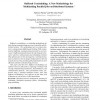Free Online Productivity Tools
i2Speak
i2Symbol
i2OCR
iTex2Img
iWeb2Print
iWeb2Shot
i2Type
iPdf2Split
iPdf2Merge
i2Bopomofo
i2Arabic
i2Style
i2Image
i2PDF
iLatex2Rtf
Sci2ools
IPPS
2000
IEEE
2000
IEEE
Buffered Coscheduling: A New Methodology for Multitasking Parallel Jobs on Distributed Systems
Buffered coscheduling is a scheduling methodology for time-sharing communicating processes in parallel and distributed systems. The methodology has two primary features: communication buffering and strobing. With communication buffering, communication generated by each processor is buffered and performed at the end of regular intervals to amortize communication and scheduling overhead. This infrastructure is then leveraged by a strobing mechanism to perform a total exchange of information at the end of each interval, thus providing global information to more efficiently schedule communicating processes. This paper describes how buffered coscheduling can optimize resource utilization by analyzing workloads with varying computational granularities, load imbalances, and communication patterns. The experimental results, performed using a detailed simulation model, show that buffered coscheduling is very effective on fast SANs such as Myrinet as well as slower switch-based LANs.
Communication Buffering | Distributed And Parallel Computing | IPPS 2000 | Schedule Communicating Processes | Time-sharing Communicating Processes |
| Added | 31 Jul 2010 |
| Updated | 31 Jul 2010 |
| Type | Conference |
| Year | 2000 |
| Where | IPPS |
| Authors | Fabrizio Petrini, Wu-chun Feng |
Comments (0)

